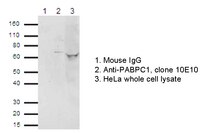03-101 Sigma-AldrichRIPAb+ PABPC1 - RIP Validated Antibody and Primer Set
This RIPAb+ PABPC1 -RIP Validated Antibody & Primer Set conveniently includes the antibody & the specific control PCR primers.
More>> This RIPAb+ PABPC1 -RIP Validated Antibody & Primer Set conveniently includes the antibody & the specific control PCR primers. Less<<Recommended Products
Áttekintés
| Replacement Information |
|---|
Kulcsspecifikációk táblázata
| Species Reactivity | Key Applications |
|---|---|
| H, Rb, Xn | RIP, IP, WB |
| References |
|---|
| Product Information | |
|---|---|
| Format | Purified |
| Control |
|
| Presentation | Anti-PABPC1, clone 10E10 (mouse monoclonal IgG) One vial 50 μg of protein A purified mouse IgG2b in 50 μL of PBS containing 0.1% sodium azide. Store at -20°C Normal Mouse IgG One vial containing 125 μg purified mouse IgG in 125 μL storage buffer containing 0.1% sodium azide. Store at -20°C. RIP Primers, ACTB One vial containing 75 μL of 5 μM of each primer specific for actin B (ACTB). Store at -20°C. FOR: TTG TTA CAG GAA GTC CCT TGC C REV: ATG CTA TCA CCT CCC CTG TGT G |
| Quality Level | MQ100 |
| Physicochemical Information |
|---|
| Dimensions |
|---|
| Materials Information |
|---|
| Toxicological Information |
|---|
| Safety Information according to GHS |
|---|
| Safety Information |
|---|
| Packaging Information | |
|---|---|
| Material Size | 10 assays |
| Material Package | 10 assays per set. Recommended use: ~5 μg antibody per RIP (dependent upon biological context). |
| Transport Information |
|---|
| Supplemental Information |
|---|
| Specifications |
|---|
| Global Trade Item Number | |
|---|---|
| Katalógusszám | GTIN |
| 03-101 | 04053252320415 |
Documentation
RIPAb+ PABPC1 - RIP Validated Antibody and Primer Set Certificates of Analysis
| Title | Lot Number |
|---|---|
| RIPAb+ PABPC1, clone 10E10 | 3082347 |
| RIPAb+ PABPC1, clone 10E10 - 2397085 | 2397085 |
| RIPAb+ PABPC1, clone 10E10 - 2537174 | 2537174 |
| RIPAb+ PABPC1, clone 10E10 - 3478351 | 3478351 |
| RIPAb+ PABPC1, clone 10E10 - JH1752521 | JH1752521 |
| RIPAb+ PABPC1, clone 10E10 - NG1627193 | NG1627193 |
| RIPAb+ PABPC1, clone 10E10 -2642151 | 2642151 |
| RIPAb+ PABPC1, clone 10E10 -2654205 | 2654205 |
| RIPAb+ PABPC1, clone 10E10 -2743633 | 2743633 |
| RIPAb+ PABPC1, clone 10E10 -2757906 | 2757906 |
Brochure
| Title |
|---|
| RNA-Binding Protein Immunoprecipitation |









